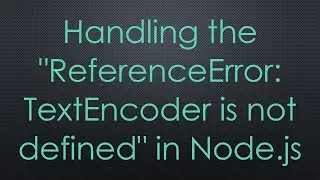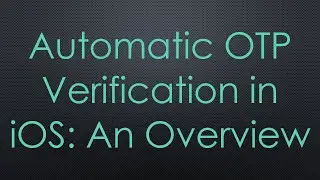Why Unicode Support is Important for PHP Beyond Browser Character Encoding
Explore the significance of Unicode support in PHP and why it goes beyond simple browser character encoding, ensuring global inclusivity and seamless user experience.
---
Disclaimer/Disclosure: Some of the content was synthetically produced using various Generative AI (artificial intelligence) tools; so, there may be inaccuracies or misleading information present in the video. Please consider this before relying on the content to make any decisions or take any actions etc. If you still have any concerns, please feel free to write them in a comment. Thank you.
---
Why Unicode Support is Important for PHP Beyond Browser Character Encoding
Character encoding is a fundamental aspect of modern web development. Traditionally, ASCII was the go-to standard for encoding text in web applications. However, ASCII's limited character set has proven insufficient for global applications. This is where Unicode comes into play, especially in the context of PHP.
What is Unicode?
Unicode is a universal character encoding standard that assigns a unique code to every character across different scripts and symbols. This includes letters from the Latin alphabet, Chinese characters, emojis, and many more. The main advantage of Unicode is that it encompasses a vast range of characters from tens of thousands of languages, making it essential for globalized application development.
Unicode vs. ASCII
ASCII (American Standard Code for Information Interchange) utilizes a 7-bit character set limited to English letters, digits, and a few additional characters. While adequate for early web applications in English-speaking regions, ASCII falls short when dealing with diverse languages and symbols.
Unicode, on the other hand, uses a more extensive character set, enabling developers to handle text from virtually any language. This extended range of characters is crucial for modern applications that require multilingual support.
The Importance of Unicode in PHP
Globalization and Localization
One of the key reasons why Unicode support is vital for PHP lies in globalization. Websites and applications today cater to a global audience. With Unicode, PHP can manage multilingual content seamlessly, ensuring that users from different linguistic backgrounds have a consistent and inclusive experience.
Data Integrity
Using Unicode in PHP ensures data integrity across different systems and platforms. When data is passed between systems with varying character encoding standards, there's a risk of misinterpretation or data loss. Unicode standardizes these characters, maintaining data integrity throughout the process.
Compatibility
Unicode support makes PHP applications more compatible with modern browsers, databases, and other web technologies. Modern HTML, XML, JSON, and database systems like MySQL and PostgreSQL are designed to work seamlessly with Unicode. Thus, PHP applications that support Unicode can better integrate with these technologies.
Improved User Experience
With Unicode, PHP applications can render text in any language accurately and without encoding issues. This leads to improved user interfaces, making the application more accessible and user-friendly for a broader audience.
Security
Unicode support also enhances security. Malformed or improperly encoded characters can sometimes be used to exploit vulnerabilities in a web application. By standardizing character encoding with Unicode, PHP can help mitigate certain classes of security risks.
Conclusion
In conclusion, Unicode support is more than just a feature—it's a necessity for modern web development with PHP. It ensures global inclusivity, maintains data integrity, enhances compatibility, improves user experience, and bolsters security. As the internet continues to evolve into a truly global platform, the importance of robust Unicode support in PHP cannot be overstated.































